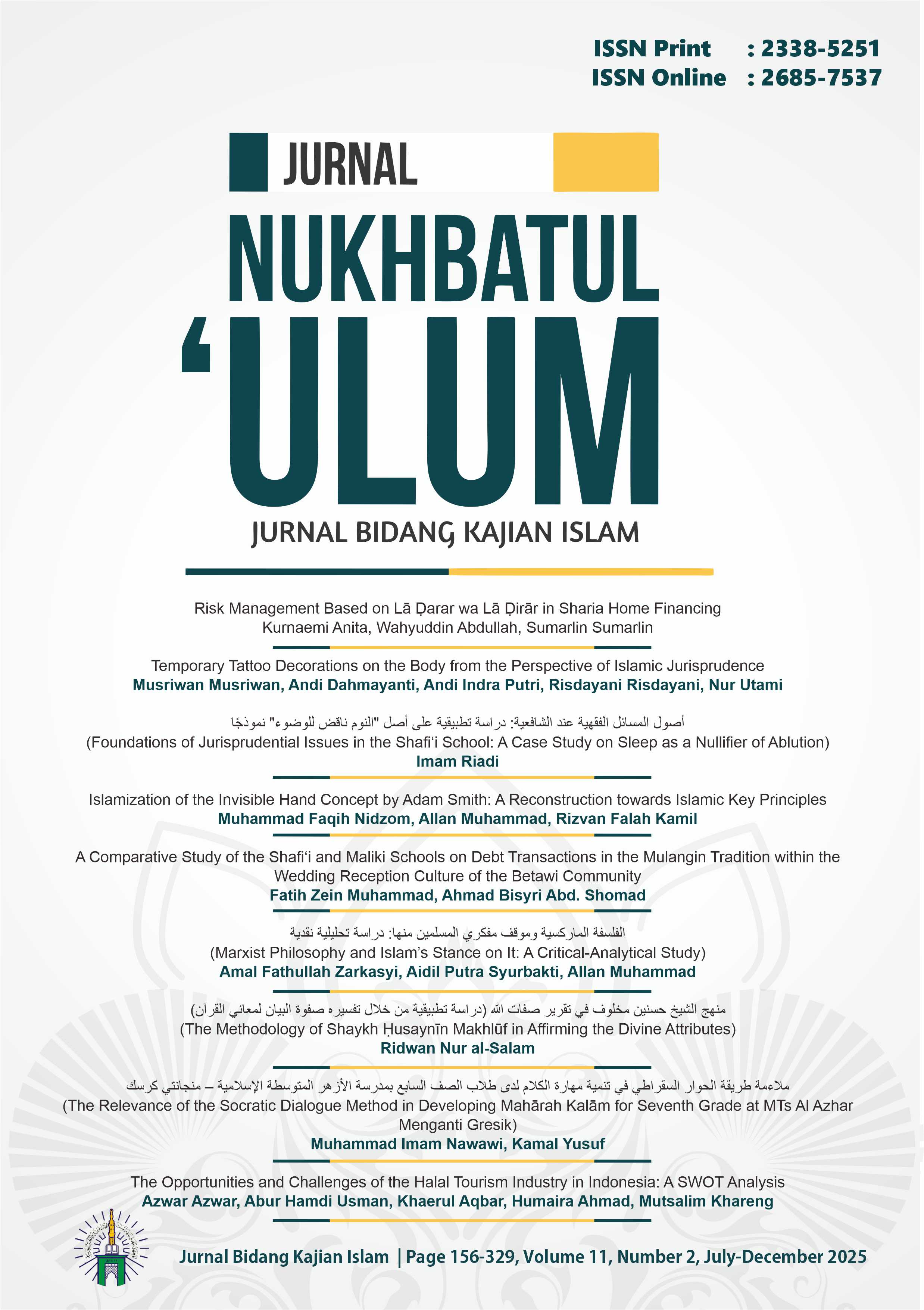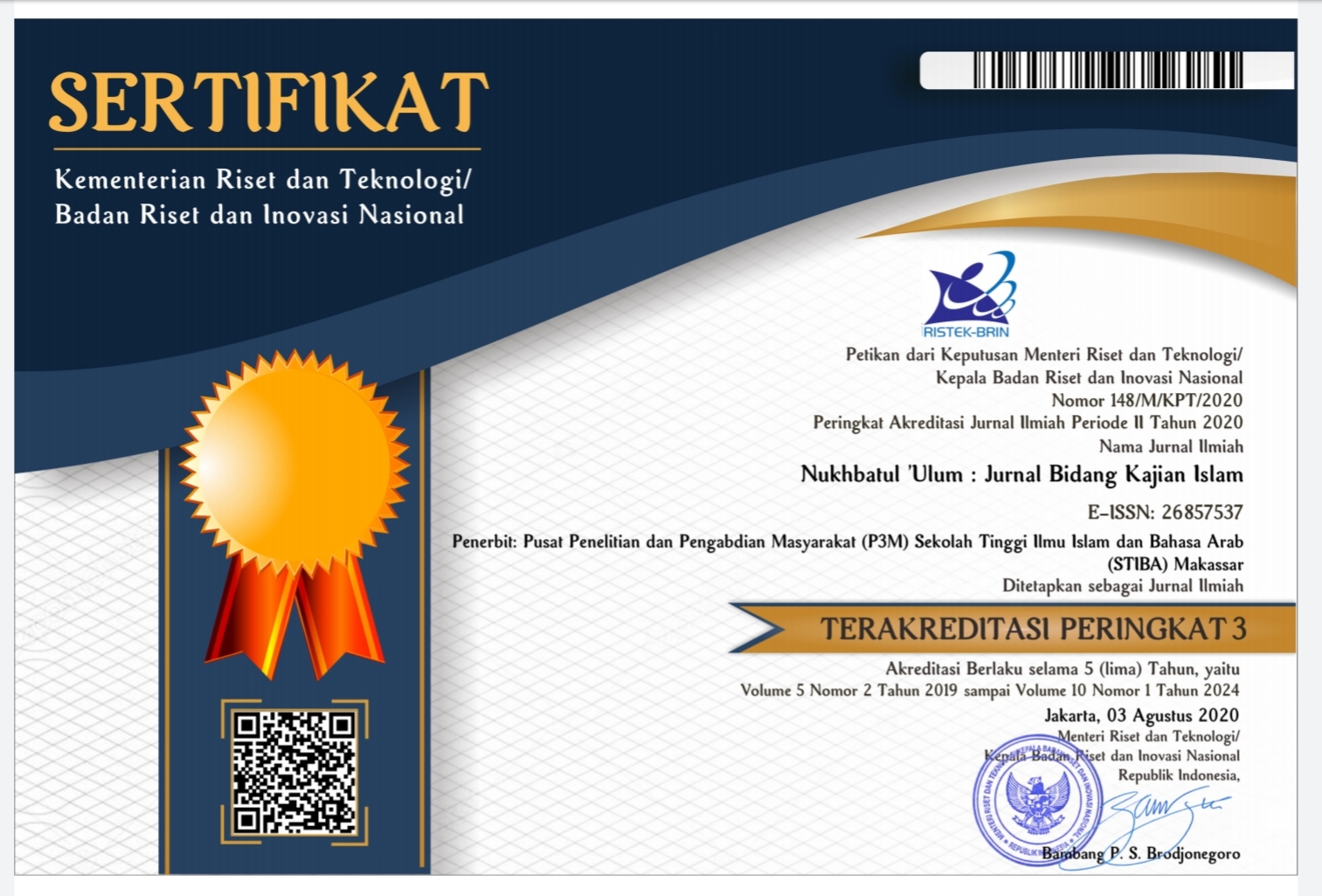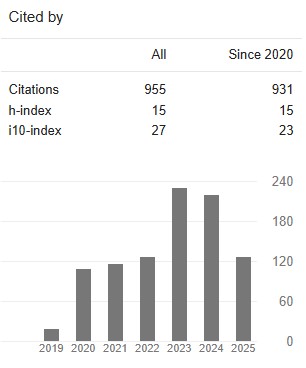Archives
-

NUKHBATUL 'ULUM: Jurnal Bidang Kajian Islam
Vol. 11 No. 2 (2025)The latest issue of NUKHBATUL ’ULUM: Jurnal Bidang Kajian Islam, Volume 11, Issue 2 (2025), presents a collection of original research articles that explore a wide range of contemporary and classical themes in Islamic studies, encompassing fiqh and uṣūl al-fiqh, Islamic economic thought, theology, philosophy, education, and socio-cultural practices. The contributions address diverse topics, including sharia-based risk management in home financing, Islamic jurisprudential perspectives on temporary tattoo practices, foundational legal reasoning within the Shāfiʿī school, comparative analyses of debt traditions in local socio-cultural contexts, the Islamization of Adam Smith’s concept of the invisible hand, critical Muslim engagements with Marxist philosophy, methodological approaches to affirming divine attributes, innovative strategies in Arabic language pedagogy, a SWOT-based assessment of Indonesia’s halal tourism industry, as well as community-based Islamic initiatives and socio-religious empowerment. In addition, this issue features an article examines faculty development management as a strategic foundation for strengthening the Tridarma of higher education. This issue features 11 original articles authored or co-authored by 33 researchers affiliated with institutions across 6 countries—Indonesia, Saudi Arabia, Malaysia, Pakistan, Thailand, and Türkiye. The diversity of institutional backgrounds and scholarly perspectives reflected in this volume underscores the dynamic and transnational character of contemporary Islamic scholarship. Collectively, the articles demonstrate the continued relevance of Islamic intellectual traditions in responding to enduring doctrinal questions while engaging critically with emerging social, economic, and global challenges.






-

NUKHBATUL 'ULUM: Jurnal Bidang Kajian Islam
Vol. 11 No. 1 (2025)The latest issue of NUKHBATUL ’ULUM: Jurnal Bidang Kajian Islam, Volume 11, Issue 1 (June 2025), presents seven original research articles exploring pivotal topics in Islamic studies — from quality standards for online da‘wah based on Ṣaḥīḥ Muslim and Shaykh ‘Abd al-Ḥaqq al-Dihlawī’s methodological approach to the Prophet’s characteristics, to grammatical analyses of al-Arba‘īn al-Nawawiyyah, the jurisprudential contributions of Imām Ibrāhīm al-Nakha‘ī in the Ḥanafī school, and the role of Bahtsul Masail in enhancing santri’s understanding of fiqh at Manbaul Hikam Islamic Boarding School in Burneh, Bangkalan. The issue also includes one article investigates the integration of artificial intelligence in ḥadīth scholarship, offering a bibliometric perspective on emerging research directions. In addition, a juridical and fiqh muʿāmalah review of carbon credit trading, examining its compatibility with Islamic legal and ethical principles. Together, these studies offer valuable insights, underscoring the richness and continued relevance of the Islamic scholarly tradition in addressing both classical and contemporary challenges. This issue has been available online since June 27, 2025, featuring seven original articles authored or co-authored by 23 researchers from 5 countries (Indonesia, Saudi Arabia, Malaysia, Thailand, and Brunei Darussalam).





-

NUKHBATUL 'ULUM: Jurnal Bidang Kajian Islam
Vol. 10 (2024)The latest issue of NUKHBATUL ’ULUM: Jurnal Bidang Kajian Islam, Volume 10, Issue 2 (December 2024), presents ten original research articles exploring diverse and timely themes in Islamic studies. It opens with a study on the diversity of Asbāb al-Wurūd utilities in jurisprudential ḥadīths, followed by an analysis of Hamka’s Tasawuf Modern, highlighting his view on mental illnesses and their spiritual treatment. Another article critically examines the al-Ḥiyal al-Syar‘iyyah concept within the Ḥanafī legal framework and its relevance to modern finance, while a separate study discusses the controversy and popularity of Waṣīyyat al-Muṣṭafā in ḥadīth scholarship. Further contributions include a proposed model for integrated land and cash waqf empowerment in apartment provision, a review of the da‘wah role of Muslimah Wahdah Tanralili Branch through the fiqh principle al-Ḍarar al-Asyaddu Yuzālu bi al-Ḍarar al-Akhaf, and an exploration of the Bilang Mule tradition in determining Ramadan’s onset. The issue also features a review of prophetic ḥadīths on suicide and their preventive implications for youth, an examination of Abu Yusuf’s fiscal thought in Kitāb al-Kharāj in relation to modern tax principles, and a study on the integration of Islamic law into local governance through the da‘wah legacy of Datuk Tellue in South Sulawesi. Together, these works reflect the journal’s commitment to advancing Islamic scholarship that bridges classical perspectives and contemporary challenges. Published online in December 2024, this issue features ten articles authored or co-authored by 28 researchers from various Indonesian institutions.

-

NUKHBATUL 'ULUM: Jurnal Bidang Kajian Islam
Vol. 10 No. 1 (2024)The June 2024 issue of NUKHBATUL ’ULUM: Jurnal Bidang Kajian Islam (Vol. 10, No. 1, 2024) presents eight original research articles engaging with a range of classical and contemporary issues in Islamic law, hadith studies, linguistics, and applied Islamic scholarship. The issue opens with a comparative study on the polemic of forced divorce between the Ḥanafī and Shāfi‘ī schools, offering valuable insights into the diversity of juristic reasoning. Another contribution examines al-Żahabī’s thought in Talkhīṣ Mustadrak al-Ḥākim, shedding light on his methodological rigor in hadith criticism. Subsequent articles include an interpretive analysis of the hadith “You know better about your worldly affairs”, a fiqh examination of selling items not yet paid for in the perspectives of the Shāfi‘ī and Ḥanbalī schools, and a study of Sharia compliance in hospital management based on DSN-MUI Fatwa No. 107/2016, using case studies from two Islamic hospitals in South Kalimantan. This issue also features a linguistic study exploring students’ mastery of fi‘il through the book al-Jāmi‘ by Ibn Ḥajar al-‘Asqalānī, followed by a legal investigation into inheritance transitioning to gifts in land certification processes. The final paper discusses the application of the fiqh maxim al-Ḍarar al-Asyaddu Yuzālu bi al-Ḍarar al-Akhaf in bathing the body of a transgender person, providing an ethical-legal framework grounded in Islamic jurisprudence. Collectively, these articles demonstrate the journal’s dedication to fostering integrative and contextually relevant Islamic scholarship. Published online in June 2024, this issue brings together contributions from 25 researchers representing diverse academic backgrounds across Indonesia.

-

NUKHBATUL 'ULUM: Jurnal Bidang Kajian Islam
Vol. 9 No. 2 (2023)The December 2023 issue of NUKHBATUL ’ULUM: Jurnal Bidang Kajian Islam (Vol. 9, No. 2) presents twelve original research articles that engage with essential themes across Islamic education, theology, jurisprudence, and applied Islamic studies. Opening the issue, a study explores the integration of moral education in Islamic Cultural History lessons at the elementary level, followed by a philosophical reflection on mindfulness from an Islamic worldview perspective. Another paper discusses the values of religious moderation in managing family livelihood among disabled husbands within the sandwich generation context. In the field of Islamic economics and business, this issue includes an analysis of Islamic business ethics in Wahdah Islamiyah business units, a conceptual study on the Business Judgement Rule through the lens of maṣlaḥah mursalah, and a paper on maṣlaḥah-based digital marketing strategies in Islamic business. Theological and spiritual concerns are also addressed through an analysis of spiritual health education in the Qur’an for preventing jinn possession. Several contributions explore classical and jurisprudential debates, including a comparative study on qiyās in determining ḥadd and kaffārah between Imām al-Shāfi‘ī and Imām Abū Ḥanīfah, and an exploration of sharī‘ah relief and the rule of al-taysīr for patients with urinary incontinence. Social and ethical dimensions of Islam are further examined in papers discussing wise tolerance in responding to pluralism, globalization and social-emotional learning based on Islamic education, and the issue of repeated hajj and ‘umrah in the thought of Ali Mustafa Yaqub. Together, these articles highlight the journal’s ongoing commitment to fostering a multidimensional understanding of Islam that bridges classical scholarship and modern realities. Published online in December 2023, this issue features twelve articles authored or co-authored by 35 researchers from universities and Islamic institutions across Indonesia.
































